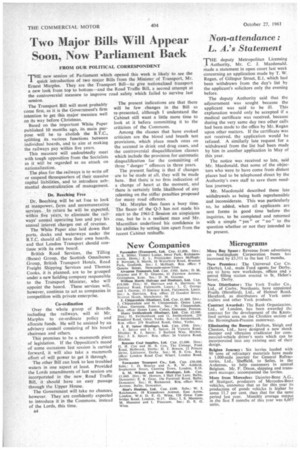Two Major Bills Will Appear Soon, Now Parliament Back
Page 38

If you've noticed an error in this article please click here to report it so we can fix it.
FROM OUR POLITICAL CORRESPONDENT new session of Parliament which opened this week is likely to see the
quick introduction of two major Bills from the Minister of Transport, Mr. Ernest Marples. They are the Transport Bill—to give nationalized transport a new look from top to bottom—and the Road Traffic Bill, a second attempt at the controversial measure to improve road safety which failed to survive last session.
The Transport Bill will most probably come first, as it is the Government's firm intention to get this major measure well on its way before Christmas.
Based on the important White Paper published 10 months ago, its main purpose will be to abolish the B.T.C., splitting its various functions between individual boards, and to aim at making the railways pay within five years.
This measure will undoubtedly meet with tough opposition from the Socialists as it will be regarded as an attack on nationalization.
The plan for the railways is to write off or suspend threequarters of their massive capital liabilities, and to introduce substantial decentralization of management.
Dr. Beechhtg Free Dr. Beeching will be set free to look at manpower, fares and unremunerative services. _In return be will be expected, within five years, to eliminate the railways' annual operating loss and pay his annual interest charges out of revenue.
The White Paper also laid down that ports, docks and waterways under the B.T.C. should all have their own boards, and that London Transport should continue with its own board.
British Road Services, the Tilling (Buses) Group, the Scottish Omnibuses Group, British Transport Hotels. Road Freight Shipping Services and Thomas Cooks, it is planned, are to be grouped under a new holding company responsible to the Transport Minister, who will appoint the board. These services will, however, continue to act as companies in competition with private enterprise.
Co-ordination Over the whole group of Boards, including the railways, will sit Mr. Marples to co-ordinate policy and allocate funds. He will be assisted by an advisory council consisting of his board chairmen and others.
This promises to be a mammoth piece of legislation, lithe Opposition's mood of some occasions last session is carried forward, it will also take a mammoth effort of will power to get it through.
The other Bill can look to less troubled waters in one aspect at least. Provided the Lords amendments of last session are incorporated in the new Road Traffic Bill, it should have an easy passage through the Upper House.
The Government will take no chances, however. They are confidently expected to introduce it in the Commons, instead of the Lords, this time.
The present indications are that there will be few changes in the Bill as re-presented, although I understand the Cabinet still want a little more time to look at it before committing it to the criticism of the Commons.
Among the clauses that have evoked criticism are the blood and breath test provisions, which place much onus on the accused in drink and drug cases, and the controversial disqualification clauses which include the provision for automatic disqualification for the committing of three " danger" offences in three years.
The present feeling is that if changes are to be made at all, they will be made here. But there is no firm indication of a change of heart at the moment, and there is certainly little likelihood of any relenting on the stiffer penalties proposed for many road offences.
Mr. Marples thus faces a busy time. The fiasco of the Q-3 has not made his start to the 1961-2 Session an auspicious one, but he is a resilient man and Mr. Macmillan underlined his confidence in his abilities by setting him apart from the recent Cabinet reshuffle.




















































































































